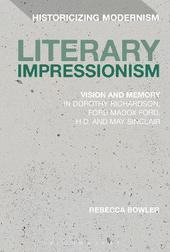
|
Literary Impressionism: Vision and Memory in Dorothy Richardson, Ford Madox Ford, H.D. and May Sinclair
Paperback / softback
Main Details
| Title |
Literary Impressionism: Vision and Memory in Dorothy Richardson, Ford Madox Ford, H.D. and May Sinclair
|
| Authors and Contributors |
By (author) Dr Rebecca Bowler
|
| Series | Historicizing Modernism |
|---|
| Physical Properties |
| Format:Paperback / softback | | Pages:256 | | Dimensions(mm): Height 234,Width 156 |
|
| Category/Genre | Literary studies - from c 1900 -
Literary studies - fiction, novelists and prose writers |
|---|
| ISBN/Barcode |
9781350063914
|
| Classifications | Dewey:823.9120911 |
|---|
| Audience | | Tertiary Education (US: College) | |
|---|
|
Publishing Details |
| Publisher |
Bloomsbury Publishing PLC
|
| Imprint |
Bloomsbury Academic
|
| Publication Date |
22 March 2018 |
| Publication Country |
United Kingdom
|
Description
With its new innovations in the visual arts, cinema and photography as well as the sciences of memory and perception, the early twentieth century saw a crisis in the relationship between what was seen and what was known. Literary Impressionism charts that modernist crisis of vision and the way that literary impressionists such as Dorothy Richardson, Ford Madox Ford, H.D., and May Sinclair used new concepts of memory in order to bridge the gap between perception and representation. Exploring the fiction of these four major writers as well as their journalism, manifesto writings, letters and diaries from the archives, Rebecca Bowler charts the progression of modernism's literary aesthetics and the changing role of memory within it.
Author Biography
Rebecca Bowler is Lecturer in Twentieth Century English Literature at Keele University, UK and was Research Associate on the Dorothy Richardson Scholarly Editions Project. She is co-founder of the May Sinclair Society.
ReviewsSubtle and compelling ... [Bowler] lists a striking range of writers described by recent criticism as impressionist ... shows superbly how all her writers, like Proust, need temporal distance from their experience in order to experience it fully. * Times Literary Supplement *
|